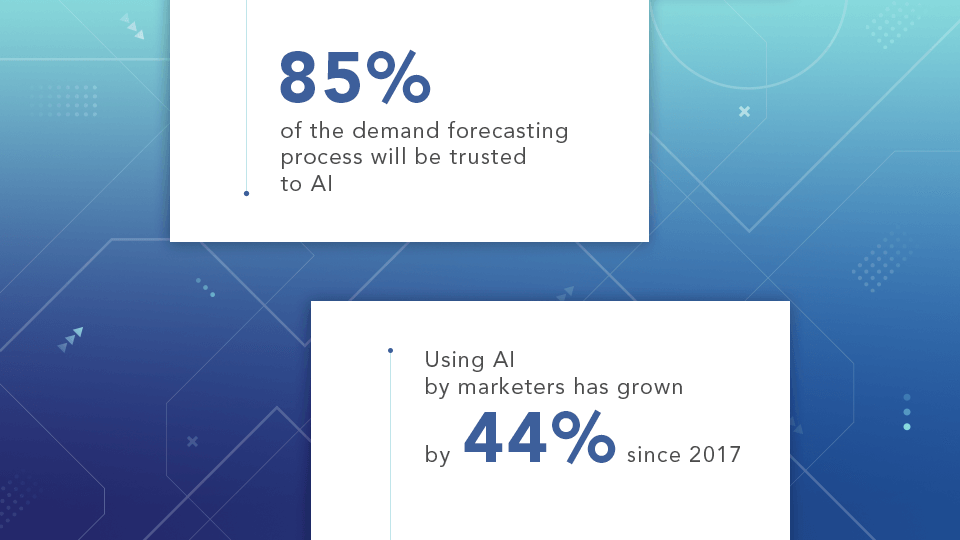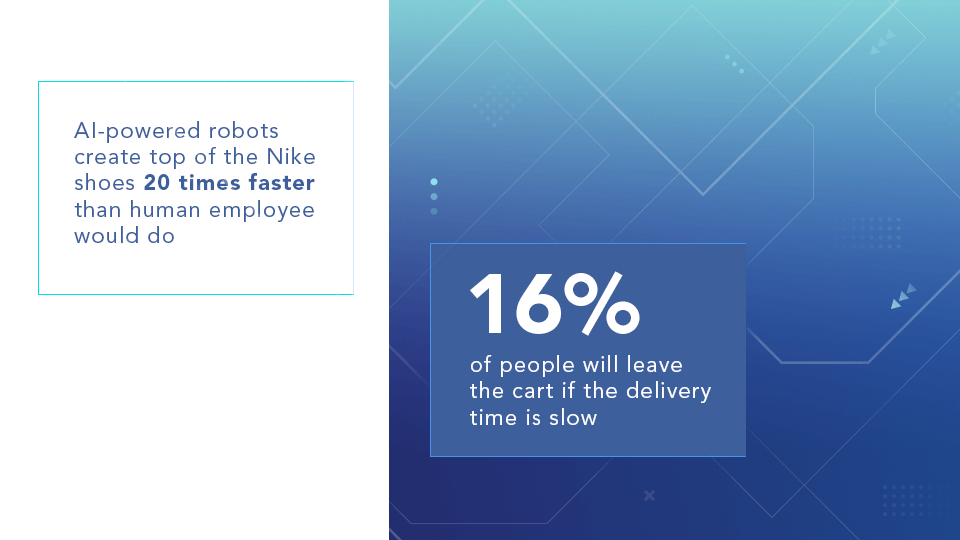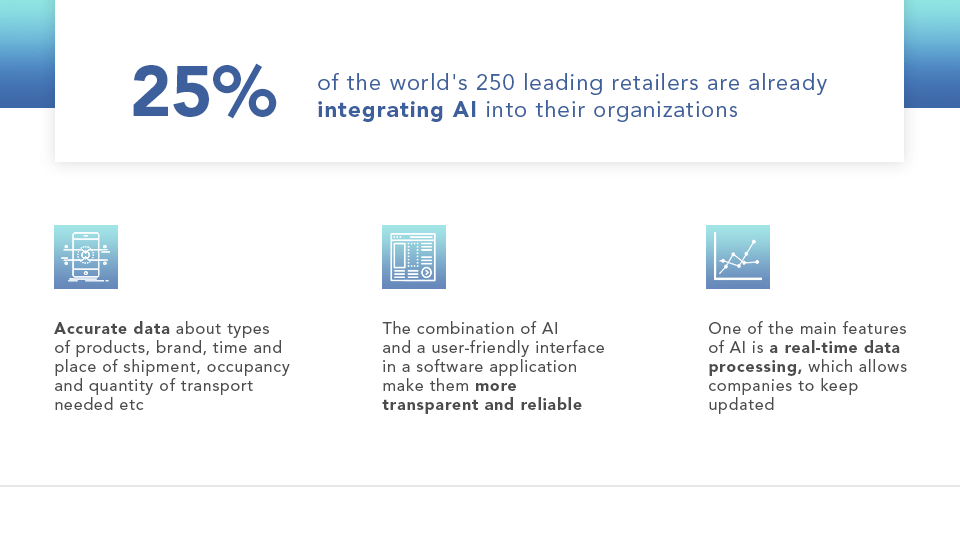“AI will be integral to virtually every process that retailers employ to run their businesses. Smart Retail is moving from a plan-to-execution model to a sense-and-respond model. That would be impossible without the decision automation that AI enables.”
Brian Kilcourse, Managing Partner at RSR Research
The retail industry is experiencing tremendous growth across most industries. Despite positive business performances across the whole segment, it is difficult for many retailers to maintain their positions in the highly competitive market. Today, many medium and small players are rapidly changing their positions in the market, which, in many cases, leads to financial losses. Conversely, large enterprises are more stable in the market as they possess great capital to spend on highly qualified teams and cutting-edge technologies that enable large enterprises to stay ahead. Top-notch technologies such as Artificial Intelligence enables retailers to effectively run their business, providing their clients with better services and more personalized experiences.
Based on our ten years of experience in business transformation, we will tell you how to properly implement Artificial Intelligence (AI) in Retail.

Implementing AI in Smart Retail
To successfully implement AI in business processes, retail companies have to have a good understanding of expertise in Artificial Intelligence technology to define the most relevant one. Big retail whales, such as Amazon and Walmart, manage highly trained and, thus, highly expensive IT teams that are responsible for applying top-notch IT technologies and cutting-edge IT solutions. By contrast, medium and small retail companies turn to third-party vendors -outsourcing companies, like Softengi, that maximize the use of resources, both time and money.
The main merit of AI is the automation of information processing in various business processes. We will give you only the main operational areas where applying AI systems deliver the greatest result.
Machine Learning
No one is surprised that any business, especially the most complex one, has to skillfully handle large sets of data. As today’s retail generates a large amount of data, and the traditional data-related methods and data analytics tools are no longer able to cope with the processing of such a layer of information, machine learning comes to the rescue.
Machine learning is not only able to process data faster and detect the slightest deviations unnoticed by humans. , but also learn by itself based on customer data. It can automatically learn valuable behavioral information about users and customers, analyze it and provide a unique experience to a particular customer.
Additionally, machine learning allows retail companies to predict customer buying behavior, offer the right delivery way, optimize the content on a separate device and even adjust the best time to communicate with the client.
Forecasts
Forecasting is an important part of the development strategy. Every AI-powered forecast is based on the analysis of historical data on a specific aspect, for example, sales, staffing, procurement, profit, loss, etc. Each forecast is adjusted according to seasonal trends, geographical location, reviews, and other factors. Even the dozens of specialists cannot cope with the constantly growing amount of data and the degree of their complexity using ordinary analytical methods. Indeed, the current conditions of the retail market sometimes require real-time forecasts. AI technology is able to make highly accurate forecasts based on real-time data and thereby increase the cost-effectiveness of specific retail processes. While you may doubt whether you need to use AI for forecasting, retailers, on average, about 85 percent of the demand forecasting process will be trusted with AI in their businesses. If you do not want to stay behind, resort to AI.
Marketing
The customer journey has become longer and harder to manage for companies. Today’s marketing has to be able to adapt to the demanding customer preferences. A marketing team requires up-to-date information on customer needs and behavior, a well-thought-out strategy based on high-quality forecasts, and, of course, AI-driven automated methods to achieve its goals. Due to the huge amount of information that needs to be processed, marketers turn to AI. In particular, AI allows them to create a highly personalized approach to clients, a narrower segmentation of their customers, and automated identification of new consumer behavior lines and desires from the collected information. According to statistics, AI adoption by marketers has grown by 44% since 2017.

Manufacturing
AI is widely applied not only in invisible data processing but also even in such an aspect of smart retail as manufacturing. Obviously, we are talking about robots. Almost all motor skills, in theory, can be replaced by robots. An employee at the plant only sets tasks, adjusts settings, and repairs in case of a breakdown. Implementing robots enables companies to reduce production time, operational costs, and expensive human labor resources as well as the cost of the product. Well-known companies Adidas and Nike can serve as good examples of the successful deployment of robots in business. With the help of a Start-up called Grabit, Nike robots create top-of-the-shoes 20 times faster than a human employee would do.

CRM
We can confidently state that smart and high-quality CRM is a must-have in smart retail. However, a truly good CRM system can be expensive for many companies. We have figured out an effective and affordable alternative. The powerful platforms based on the SAS model offered by Salesforce allow us to develop effective applications that significantly save the retailer’s money.
With the AI capabilities, integration of natural language learning (NLP) technology in CRM systems without prejudice to other systems. Moreover, applying NLP technology allows a CRM system to directly respond to the requests of customers, for example, in voice chats, as well as to solve problems and resolve conflicts without human intervention.
Logistics
Logistics is one of the most important segments in the retail industry. To run smoothly, retailers have to turn to cutting-edge solutions offered by the IT industry. If potential customers can not find a needed or desired product on a shelf, they mostly never return to that provider again. Especially if customers come to the store for a particular product and can not find it, and even if there are a hundred more similar products on shelves, they will feel disappointed with the retailer. Logistics is a critical aspect of the retail business pivotal to the company’s success. As the logistics segment generates a lot of data about types of products, brand, time and place of shipment, occupancy and quantity of transport needed, etc.
Speed and reliability of delivery are those factors that determine the effectiveness of a retail business. Disruptions and errors in distribution often occur due to unforeseen circumstances, such as weather conditions, customs problems, human factors vehicle breakdowns.
The combination of AI and a user-friendly interface in a software application can enhance logistics processes, making them more transparent and reliable. AI-based technology allows to quickly and accurately process data on all current deliveries, detecting anomalies and making predictions about future results. One of the main features of AI is real-time data processing, which allows companies to keep updated. For instance, if a storm warning is issued, the AI system will notify users and adjust logistics processes and operations in accordance with the warning.
Additionally, AI in logistics allows companies to promptly process the data from numerous devices connected by the Internet of Things (IoT) technology, which has a lot of traction in retail.
Delivery
Talking about good delivery, we often imply three main points: speed, reasonable price, and reliability. These three points mostly determine an excellent delivery service and brand reputation. For modern customers, speed of delivery is the paramount factor. 16% of people will leave the cart if the delivery time is slow. However, it is not an easy task for a retailer to maintain high-quality service on par with high delivery speed. The capabilities of AI allow us to coordinate delivery operations as efficiently and quickly as possible.

For instance, having more than one delivery window, the AI system can even change the route without operator intervention.
As for the delivery price, it is more complicated. After all, the cost of delivery depends on two factors: the density of the delivery route – how many orders can be delivered for a certain delivery period, and the size of orders – how many orders are delivered at each stop. AI systems quickly calculate orders and choose an optimal route and an order amount that can be taken at once.
Delivery reliability is another key element for retail success. If a retail company is not yet able to afford a decent delivery system, then it has to turn to reliable third-party vendors. However, if customers encounter poor delivery, they will associate it with the retail company and not with company’s delivery partners.
Bond With Customer
As the retail market becomes more competitive, companies have to find new ways to do their business more efficiently and financially well. In order to succeed, retail companies have not only to stand out in the market but also build close relationships with their customers, both current and potential. Advertising, newsletters, promotions, and websites must become more personalized to attract and retain customers successfully. Personalization is one of the key features that will help companies to get ahead of the competition.
To implement a high-quality AI system, a company needs a team of a marketer, a data scientist, a solution architect, developers, and UX / UI specialists. Hiring such a team full-time is an expensive and wasteful decision. A better alternative is to outsource the development of AI systems or approach a consulting company. AI technology takes a company’s relationship with its customers to the next level. AI-driven systems process a huge amount of customer behavior data, both historical and online, and then provides companies with valuable insights.
In addition, as an AI system processes customer-related data, it can better understand the company’s audience and hence target it with appealing content, analyzing customer reactions to it and making needed adjustments to the content. As a result, retail companies can create an engaging buying experience for their customers.
Conclusion
Smart retail is the undoubted future of retail. The digital age requires a strategy and approach change in most segments of this industry. To stay ahead, retail companies need to use available data, which retail companies have more than enough, wisely. AI has the potential to increase the efficiency of each retail chain and enhance profitability of the whole company business. However, implementing AI technologies can cost plenty of time and money.
While you are thinking about whether you need smart retail, your competitors might be already implementing it in their business, making a huge profit. According to the Capgemini Research Institute, 25% of the world’s 250 leading retailers are already integrating AI into their organizations. Do not miss the opportunity to fall into this 25 percent and start transforming your retail into smart retail. Softengi, with 10 years of experience in digital business transformation, is ready to help you to successfully implement AI tools and prove that exactly AI will be the cause of your future growth.





